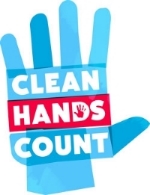I remember the feeling of relief when my daughter was first admitted to the hospital—aside from giving birth, my experience with hospitals was limited and I was still under the impression that a hospital provided life-saving care and, even if a cure wasn’t possible, safety. What I did not know was that many unnecessary deaths happen in hospitals each year—not only through medical errors, but, more surprisingly, through the spread of infection that is preventable. In fact, according to the World Health Organization, about 7% of hospital patients in developed countries get healthcare-associated infections each year—that’s 7 people for every 100 hospital admissions. How is this possible?
Wash Your Hands!
One of the most common causes for the spread of infection in a hospital is when those who come into contact with a patient DO NOT WASH THEIR HANDS. Doctors, nurses, other healthcare professionals, as well as visitors (yourself included) need to wash their hands every time they enter and exit a patient room—or move between patients if you are in a shared room or ICU. Despite signs on doors in patient rooms, as well as in corridors and elevators reminding people to WASH YOUR HANDS—hospitals are a busy place. According to the Centers for Disease Control, on average, healthcare providers clean their hands less than half of the times they should. On any given day, about one in 25 hospital patients has at least one healthcare-associated infection.
The Facts about Hand Hygiene
Bet you didn’t know that there is a World Hand Hygiene Day! Yup, sponsored by the Centers for Disease Control and Prevention (CDC), this past year it was May 5th—so, yeah, this is a big deal. Here are three facts published by the CDC related to the importance of good hand hygiene in hospital settings:
1- On average, healthcare providers clean their hands less than half of the times they should
2- Alcohol-based hand sanitizers kill most of the bad germs that make you sick
3- Alcohol-based hand sanitizer does not kill C. difficile (wash your hands with soap and water to kill C. difficile—and if you’ve got it, make sure those treating you wear gloves to prevent spreading it to others)
Source: http://www.cdc.gov/handhygiene/patients
Can we talk? Please, Wash Your Hands!
Doctors, nurses and other medical personnel can be hurried, especially if there is an emergency. I wouldn’t recommend asking someone in the midst of administering a critical intervention from stopping what he or she is doing to wash their hands, however, I do strongly recommend that you remind those who come in contact with yourself or a loved one in the hospital to stop and wash his or her hands before administering care. In fact, the CDC specifically asks that patients and their families remind healthcare professionals to practice good hand hygiene. In a shared room? Make sure the staff washes hands when moving between patients. Feel embarrassed asking someone to wash their hands? Get over it. It could be the difference between life or death, or, more likely, a bad infection and medical setback. The same goes for friends and family. When they enter the room—ask them to please wash their hands. Same goes for when they are ready to leave--on the way out of the hospital room? Remember to WASH YOUR HANDS. They are protecting themselves as well as all who come into contact with them.
How to Wash Your Hands
Most of us think we know how to wash our hands—we’ve been doing it since we were toddlers, right? But there is a best practice, established by our friends at the CDC, and it’s worth reviewing. Here are the CDC guidelines:
- Wash your hands for at least 15 seconds, not specifically 15 seconds (when there was an outbreak of norovirus at my son’s university, students were advised to hum the school fight song to gauge how long they needed to wash—hey, whatever works!)
- The time it takes is less important than making sure you clean all areas of your hands
- Alcohol-based hand sanitizers are the preferred way to clean your hands in healthcare facilities
Finally, A Handy Reminder
Make sure your hospital room has signs, on the door and over the sink, reminding people to wash their hands. Post one above the patient’s bed—at eye level where it will be noticed--visual reminders—for all who come into contact with the patient. A visual reminder won’t take the place of speaking up if someone “forgets” to wash their hands. If these visual cues don’t work, don’t be shy—do your part to reduce the spread of infection and, instead, spread the CDC’s message—Clean Hands Count, Clean Hands Care. Someone’s life might depend on it.
Clean Hands Count Image Credit: www,cdc,gov/handhygiene Patient Image Credit: Deb Biggs
In our next blog post—The Empowered Patient: Why you Should Request and Read your Medical Records

